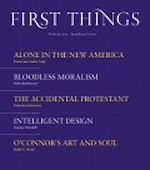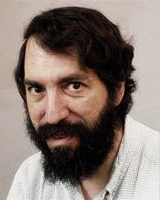 Evolution
Evolution
 Faith & Science
Faith & Science
 Intelligent Design
Intelligent Design
Writing in First Things, Stephen Meredith Offers Confusion in the Guise of Critique
 The February issue of the thoughtful religious journal First Things is out and readers will likely be surprised and disappointed by a rather impetuous essay, "Looking for God in All the Wrong Places," by Stephen Meredith, criticizing the theory of intelligent design.
The February issue of the thoughtful religious journal First Things is out and readers will likely be surprised and disappointed by a rather impetuous essay, "Looking for God in All the Wrong Places," by Stephen Meredith, criticizing the theory of intelligent design.
Of course ID is a scientific not a religious hypothesis, one that succeeds or fails based on scientific criteria. Yet Meredith, a pathologist who teaches literature courses at the University of Chicago, largely dispenses with the science, instead subjecting ID to a critique as theology. Even if we were to grant that such a critique is relevant in the first place, Meredith in his article stumbles badly. I see three basic errors. He has 1) a faulty view of ID’s relationship to nature, miracles, and the supernatural; 2) no clear definition of what ID really is; and 3) an erroneous view of much of the history related to ID, evolution, and theology.
 In company with John Derbyshire, Meredith (pictured at right) insists that ID proponents are "occasionalists," holding to a particular theological understanding of causation. As occasionalists they do "not credit natural or physical law with enough causal power to enact evolution on its own." Instead they "educe supernatural causes to do most of the heavy lifting in worldly events." This is a fundamental misunderstanding. ID does not require the "breaking" of natural law or the notion that a natural law would have done X but instead Y happened. As William A. Dembski has pointed out, ID doesn’t need this "counterfactual substitution." People act, for example, as intelligent agents not by "breaking" or "suspending" natural laws but by arranging or front-loading laws to suite particular ends (The Design Revolution, pp. 181-182). Meredith seems to argue that ID is incongruous with modern science because it invokes miracles and yields to supernatural causes. Here Meredith is making an old mistake, called out again by Dembski: "The contrast between natural law and supernatural causes is the wrong contrast. The proper contrast is between undirected natural causes on the one hand and intelligent causes on the other" (p. 189).
In company with John Derbyshire, Meredith (pictured at right) insists that ID proponents are "occasionalists," holding to a particular theological understanding of causation. As occasionalists they do "not credit natural or physical law with enough causal power to enact evolution on its own." Instead they "educe supernatural causes to do most of the heavy lifting in worldly events." This is a fundamental misunderstanding. ID does not require the "breaking" of natural law or the notion that a natural law would have done X but instead Y happened. As William A. Dembski has pointed out, ID doesn’t need this "counterfactual substitution." People act, for example, as intelligent agents not by "breaking" or "suspending" natural laws but by arranging or front-loading laws to suite particular ends (The Design Revolution, pp. 181-182). Meredith seems to argue that ID is incongruous with modern science because it invokes miracles and yields to supernatural causes. Here Meredith is making an old mistake, called out again by Dembski: "The contrast between natural law and supernatural causes is the wrong contrast. The proper contrast is between undirected natural causes on the one hand and intelligent causes on the other" (p. 189).
Furthermore, Meredith’s concern regarding miracles contravening natural laws seems to suggest a position of tension between the miraculous and science itself. However, this is not a scientific position. It is a philosophical one suggestive of methodological naturalism. "Scientists, as scientists," Norman Geisler explains, "need not be so narrow as to believe that nothing can ever count as a miracle. All a scientist needs to hold is the premise that every event has a cause and that the observable universe operates in an orderly way" (Baker Encyclopedia of Christian Apologetics, p. 467). Meredith’s whole argument about ID, miracles, and the so-called "breaking" of natural laws is nothing but a red herring. Again, the real issue is about the nature of causation not about natural law.
Meredith has no accurate working definition of what ID actually is. For example he refers to ID proponents as suggesting that intelligence "intervenes" in "suspending ordinary natural law," but I am not familiar with any major ID theorist who argues in this way. This lack of understanding comes through even more clearly when he states, "God is not really an empirical datum. He is, rather, an inference that one might draw from empirical data." Stephen Meyer has said precisely this — ID is an inference to the best explanation, it is a forensic conclusion drawn by means of abductive reasoning. Meredith’s irrelevant quote from Stephen Meyer’s Darwin’s Doubt only underscores his ignorance of what ID really is. Had Meredith read Meyer’s Signature in the Cell he would understand that "the theory of intelligent design holds that there are tell-tale features of living systems and the universe that are best explained by an intelligent cause" (tell-tale is key here!), and this definition fits perfectly with the reference to Romans 1:20 that Meredith so proudly gives as a purported contradiction of ID.
Meredith’s confusion is exacerbated by his notably poor understanding of the history of ID and Darwinian theory. This will take some unpacking. To begin with, Meredith seems to assume that ID burst upon the scene at Pajaro Dunes in 1993, but in fact it has much deeper roots dating back as far as the Greek philosopher Anaxagoras (500-428 BC). In fact, the roots of modern science can be found not in the thought of materialist reductionists like Darwin but in that of the men who formed what has been called the Philosophical Breakfast Club. Richard Jones (1790-1855), Charles Babbage (1791-1871), John Herschel (1792-1871), and William Whewell (1794-1866) all presumed natural laws to have a Lawgiver, leading William Whewell to famously refer to Darwin’s version of natural selection as "the law of higgledy-piggledy." It wasn’t the principle itself that disturbed Whewell, but rather its wholly random and blind nature as Darwin described it. Writing in a vacuum, Meredith instead presumptuously ascribes certain positions, "assertions," and "claims," to present-day ID proponents and calls upon certain historical giants (e.g. Thomas Aquinas and Augustine) to slay the straw men he has created. This is an old, familiar strategy to be sure, but not one promising to add much clarity or understanding to the discussion.
If Meredith knew more history, for example, he might not have complained about how Tennyson’s "nature red in tooth and claw" only makes the problem of evil worse in the hands of ID proponents. Indeed, most ID advocates would probably argue against Tennyson’s colorful but superficial description of nature. Alfred Russel Wallace (1823-1913), himself a co-discoverer of the theory of evolution by natural selection, argued forcefully in favor of intelligent evolution, and addressed the problem of evil in "Is Nature Cruel?" in The World of Life (1910). Meredith seems to think that ID only compounds the problem of evil, but Wallace himself dealt with this issue at length, seeing pain as strictly limited by utilitarian principles and indeed purposeful and perfectly consonant with the intentions of the "foreordained method of a supreme mind." For Wallace, who saw all of nature as "a manifestation of creative power, directive mind and ultimate purpose," the evil of pain and suffering was not at odds with his teleological world. Whether Wallace fully and effectively addressed this question is a separate question, but the issue is far more complex and nuanced than Meredith suggests.
The final aspect of Meredith’s historical error is his seriously flawed presentation of Darwin’s theological views and how they relate directly to his theory. Because this historical error has been made by others, it is important enough to warrant a subsequent article.
Photo credit: Department of Pathology, University of Chicago.
